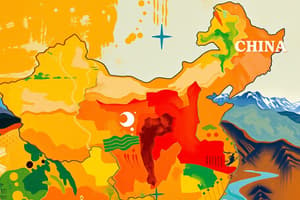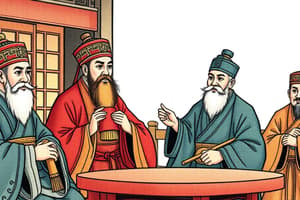Podcast
Questions and Answers
What class in ancient China held educated degrees and enjoyed special privileges?
What class in ancient China held educated degrees and enjoyed special privileges?
- Noble class
- Peasant class
- Scholar-gentry class (correct)
- Merchant class
When did the Yellow Turban Rebellion occur?
When did the Yellow Turban Rebellion occur?
184 C.E.
Jati is a caste within a caste based on __________.
Jati is a caste within a caste based on __________.
occupation
What system is credited with ensuring the continuity of traditional social organization in India?
What system is credited with ensuring the continuity of traditional social organization in India?
In Indian society, high status is associated with pollution.
In Indian society, high status is associated with pollution.
What was a common form of slavery in the Greek and Roman world?
What was a common form of slavery in the Greek and Roman world?
Who led a revolt of 70,000 slaves against the Roman Empire?
Who led a revolt of 70,000 slaves against the Roman Empire?
Which woman was the only empress of China?
Which woman was the only empress of China?
Who was noted for advancing democracy in Athens and ordering the construction of the Parthenon?
Who was noted for advancing democracy in Athens and ordering the construction of the Parthenon?
What were Helots in Spartan society?
What were Helots in Spartan society?
Flashcards are hidden until you start studying
Study Notes
China's Scholar-Gentry Class
- Existed during the Han dynasty; comprised educated degree-holders like xiucai, juren, and jinshi.
- Represented about 5% qualified for officials; most remained local social leaders.
- Conducted social welfare, education, legal dispute resolution, and community projects.
- Supervised local law and order while promoting Confucian values; vital for local governance despite no official salary.
Yellow Turban Rebellion
- Major peasant uprising in China starting in 184 C.E.
- Aimed to establish a Daoist society and contributed to the collapse of the Han dynasty.
Caste as Varni and Jati
- Jati refers to sub-castes based on occupation; varni denotes major social groups in Indian society.
Functions of Caste
- The caste system maintains India’s traditional social structure.
- Accommodated diverse communities, including invading tribes.
- Knowledge and skills of occupations passed down through generations.
- Promoted interdependent relationships among castes within villages via the Jajmani system.
- Rituals fostered cooperation and community unity across castes.
Ritual Purity in Indian Social Practice
- Status differences in society linked to concepts of ritual purity and pollution.
- High status correlates with purity; low status with pollution.
- Inherent purity exists within high-caste members, while transitory purity relates to daily actions (e.g., bathing).
- Ritual cleanliness maintained through daily practices, food choices, and avoidance of lower caste contact.
- Activities linked to death or violence considered polluting.
Greek and Roman Slavery
- Slavery existed due to wars, piracy, abandoned children, and trade.
- Household service was prevalent among Greeks; brutal labor was common in Roman mines and plantations.
- Manumission allowed slaves to gain freedom through work.
Spartacus
- Led a significant rebellion of 70,000 slaves against the Roman Empire.
Empress Wu
- Ruled during the Tang Dynasty (625-705 AD); sole female empress of China.
- Known for her intelligence, talent, and ruthlessness.
Aspasia and Pericles
- Prominent Athenian couple; he was a leader advocating for democracy and commissioning the Parthenon.
- Aspasia, a well-educated woman, taught public speaking to many Athenians and influenced philosophical thought, including Plato’s ideas.
Helots
- Enslaved population of Spartans; revolted around 650 B.C.E., posing a significant threat to Sparta's stability.
Studying That Suits You
Use AI to generate personalized quizzes and flashcards to suit your learning preferences.




